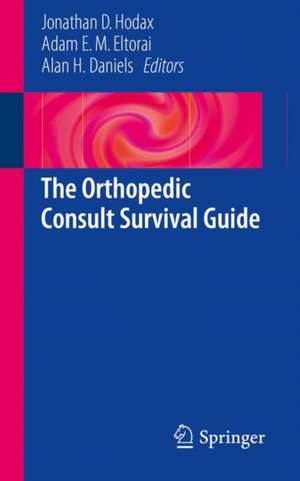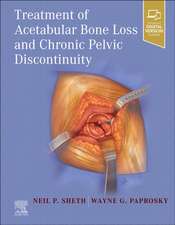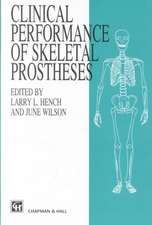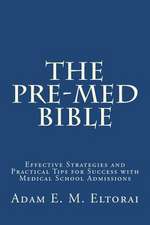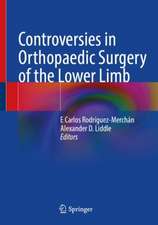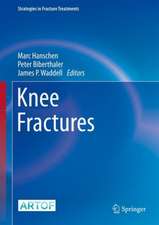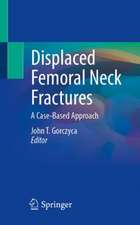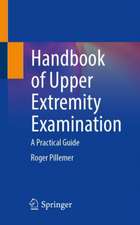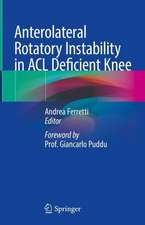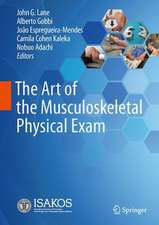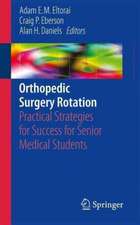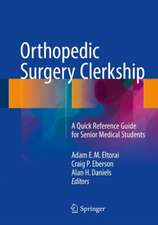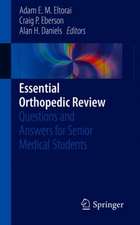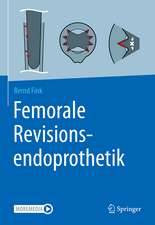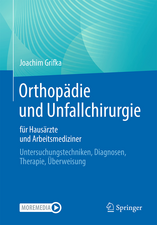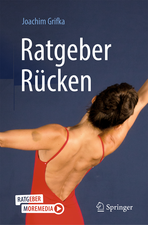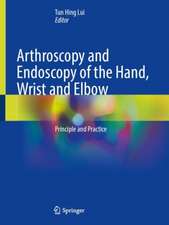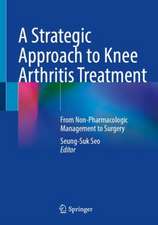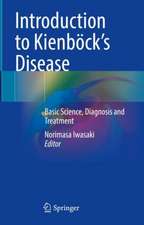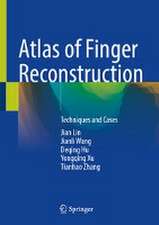The Orthopedic Consult Survival Guide
Editat de Jonathan D. Hodax, Adam E. M. Eltorai, Alan H. Danielsen Limba Engleză Paperback – 13 apr 2017
Covering all aspects of acute care, The Orthopedic Consult Survival Guide is an indispensable tool for medical students, residents, fellows, attendings , and affiliated providers in orthopedic surgery, emergency medicine, and surgery caring for orthopedic patients in emergency rooms, urgent care centers, and primary practice settings.
Preț: 524.29 lei
Preț vechi: 551.88 lei
-5% Nou
Puncte Express: 786
Preț estimativ în valută:
100.35€ • 109.04$ • 84.35£
100.35€ • 109.04$ • 84.35£
Carte tipărită la comandă
Livrare economică 16-22 aprilie
Preluare comenzi: 021 569.72.76
Specificații
ISBN-13: 9783319523460
ISBN-10: 3319523465
Pagini: 141
Ilustrații: XIX, 298 p. 63 illus., 14 illus. in color.
Dimensiuni: 127 x 203 mm
Greutate: 0.39 kg
Ediția:1st ed. 2017
Editura: Springer International Publishing
Colecția Springer
Locul publicării:Cham, Switzerland
ISBN-10: 3319523465
Pagini: 141
Ilustrații: XIX, 298 p. 63 illus., 14 illus. in color.
Dimensiuni: 127 x 203 mm
Greutate: 0.39 kg
Ediția:1st ed. 2017
Editura: Springer International Publishing
Colecția Springer
Locul publicării:Cham, Switzerland
Cuprins
Foreword.- Preface.- Acknowledgements .- Part 1: Special Considerations in Orthopedics.- 1. The Polytrauma Patient.- 2. Open Fractures.- 3. High energy trauma.- 4.Penetrating trauma.- 5. Never-Miss Conditions.- Part 2: Skills and Techniques for Diagnosing and Treating Musculoskeletal Injuries.- 6. Splinting and Casting Techniques.- 7. Joint Aspiration and Injection.- 8. Hematoma Block.- 9. Basic Fracture Reduction Principles.- 10. Traction Pin Placement.- Part 3: Upper Extremity Injuries.- 11. Soft Tissue Injuries of the Hand.- 12. Adult Digital and Metacarpal Injuries.- 13. Pediatric Digital and Metacarpal Injuries.- 14. Adult Carpal Injuries.- 15. Adult Distal Radius Fractures.- 16. Pediatric Wrist and Scaphoid Fractures.- 17. Adult Forearm Fractures.- 18. Pediatric Forearm Fractures.- 19. Elbow Dislocations.- 20. Pediatric Elbow Fractures.- 21. Humerus Fractures.- 22. Glenohumeral Dislocation.- 23. Pediatric Shoulder Injures: Proximal Humerus Fractures and Clavicle Fractures.- 24. Clavicle Fractures and Dislocations.- Part 4: Axial Skeletal Injuries.- 25. Cervical Spine Trauma.- 26. Cervical Stenosis and Central Cord Syndrome.- 27. Thoracolumbar Spine Trauma.- 28. Lumbar Stenosis and Cauda Equina Syndrome.- 29. Spinal Epidural Abscess.- 30. Sacral Fractures.- 31. Pelvis Fractures (AP Mechanism).- 32. Pelvic Fractures (Lateral Compression Mechanism).- 33. Vertical Shear Pelvic Injuries.- 34. Pubic Rami Fractures.- 35. Acetabular Fractures.- Part 5: Lower extremity injuries.- 36. Hip Dislocations.- 37. Femoral Head Fractures in the Geriatric Patient.- 38. Femoral Head Fractures in the Young Patient.- 39. Intertrochanteric, Basicervical, and Femoral Neck Fracture in the Geriatric Patient.- 40. Subtrochanteric Femur Fractures.- 41. Adult Femoral Shaft Fractures.- 42. Pediatric Femur Fractures.- 43. Distal Femur Fractures.- 44. Patellar Dislocation.- 45. Ligament Injuries of the Knee.- 46. Patellar Fractures.- 47. Tibial Plateau Fractures.- 48. Adult Tibial Shaft Fractures.- 49. Pediatric Tibial Shaft Fractures.- 50. Pilon (Axial Load) Ankle Fractures.- 51. Rotational Ankle Fractures.- 52. Pediatric Ankle Fractures.- 53. The Hindfoot.- 54. Midfoot Injuries.- 55. Injuries of the Forefoot.
Notă biografică
Jonathan Hodax, MD, Warren Alpert Medical School of Brown University, Providence, RI, USA
Adam E. M. Eltorai, MD, Warren Alpert Medical School of Brown University, Providence, RI, USA
Alan H. Daniels, MD, Warren Alpert Medical School of Brown University, Department of Orthopedic Surgery, Providence, RI, USA
Textul de pe ultima copertă
This is a quick-reference resource covering the most common acute orthopedic injuries. Including bulleted text and easy-to-follow algorithms, protocols, and images, this “pocket consultant” provides the most up-to-date information when you need it most. Organized anatomically for fast reference, each chapter is broken down into the most common and most serious injuries with tips on how to evaluate and treat adult and pediatric patients. Each injury pattern discussed includes a brief description covering what to ask, what to bring, what to request, what to test, what to look for, and how to further evaluate. The contributing authors are senior orthopedic surgery residents at a major Level-1 Trauma Center who have experience managing a high volume of orthopedic injuries and who have trained many young residents.
Covering all aspects of acute care, The Orthopedic Consult Survival Guide is an indispensable tool for medical students, residents, fellows, attendings , and affiliated providers in orthopedic surgery, emergency medicine, and surgery caring for orthopedic patients in emergency rooms, urgent care centers, and primary practice settings.
Covering all aspects of acute care, The Orthopedic Consult Survival Guide is an indispensable tool for medical students, residents, fellows, attendings , and affiliated providers in orthopedic surgery, emergency medicine, and surgery caring for orthopedic patients in emergency rooms, urgent care centers, and primary practice settings.
Caracteristici
A quick-reference guide that includes bulleted text and easy-to-follow algorithms, protocols, and illustrations and radiographs, acting as a “pocket consultant” to provide the most up-to-date information at a moment's notice Each injury pattern discussed includes a one-page description covering what to ask, what to bring, what to request, what to test, what to look for, and how to further evaluate, with differing treatments between adult and pediatric patients Contributing authors are senior orthopedic surgery residents at a major Level-1 Trauma Center who have experience managing a high volume of orthopedic injuries and who have trained many young residents
